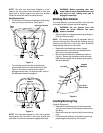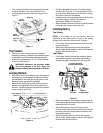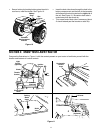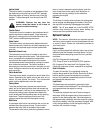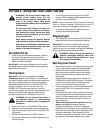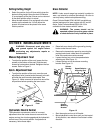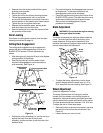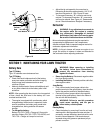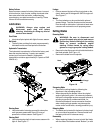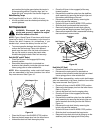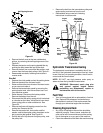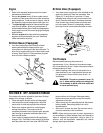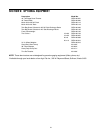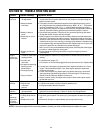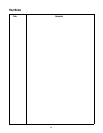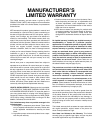
22
SECTION 10: TROUBLE SHOOTING GUIDE
NOTE: If the above steps fail to correct the problem, contact your local authorized service dealer for repair.
Trouble Possible Cause(s) Corrective Action
Engine will
not crank
1. Safety switch button
not depressed.
2. Battery installed
incorrectly.
3. Battery is dead or
weak.
4. Blown fuse or circuit
breaker.
5. Engine ground wire
loose.
1. There are two switches in the starting circuit of your unit: the clutch pedal switch
and the deck lift lever switch. Make certain the actuator is fully depressing the
buttons on each switch.
2. The battery must be installed with negative terminal attached to black ground
wire. Negative terminal is identified at the post by “NEG”, “N” or “-”. The positive
terminal, identified by “POS”, “P” or “+”, must be attached to the big red wire
which goes to the solenoid. All batteries are to be fully charged before installing.
Refer to “Quick Start” battery guide that came with the operator’s manual.
3. Check fluid level in battery. If fluid is low, fill to just below split rings with water.
Charge with 6 AMP charger until fully charged.
4. Refer to operator’s manual for fuse box location. Replace fuse with automotive
type fuse. Fuses seldom fail without a reason. The problem must be corrected.
Check for loose connections in the fuse holder. Replace fuse holder if necessary.
A dead short may be in the cranking or charging circuit where the insulation may
have rubbed through and exposed the bare wire. Replace the wire or repair with
electrician's tape if the wire strands have not been damaged.
Note: Look for a wire pinched between body panels, burned by the exhaust pipe
or muffler or rubbed against a moving part.
5. Engine should have a black ground wire running from engine to frame or
mounting bolt.
Engine
cranks but
will not start
1. Throttle or choke not in
starting position.
2. No fuel to the
carburetor.
3. No spark to spark plug.
Spark plug lead
disconnected.
4. Faulty spark plug.
5. Dirty air cleaner.
1. Check operator's manual for correct position for throttle control and choke for
starting.
2. A. Gasoline tank empty. Fill.
B. Fuel line or in-line fuel filter plugged. Remove and clean fuel line. Replace filter
.
3. Connect lead. Hold spark plug lead away from engine block about 1/8". Crank
engine. There should be a spark. If not, have engine repaired at authorized
engine service dealer.
4. To test, remove spark plug. Attach spark plug lead to spark plug. Ground the
spark plug body against the engine block. Crank the engine. The spark plug
should fire at the electrode. Replace if it does not.
5. If the air cleaner is dirty, the engine may not start. Refer to the engine manual
packed with your unit.
Engine
smokes
1. Engine oil overfilled.
2. Engine loses
crankcase
vacuum.
1. Check oil level.
2. A. Dipstick not seated or broken. Replace defective part.
B. Engine breather defective. Replace.
Excessive
vibration
1. Bent or
damaged blade.
1. Stop engine immediately. Check all pulleys, blade adapters, keys and bolts for
tightness and spindle damage. Tighten or replace any damaged parts.
Mower will
not
discharge
grass and/
or leaves
uncut strips
1. Engine speed low.
2. Cutting height set too
low.
3. Blades short or dull.
1. Throttle must be set at full throttle.
2. Use lower ground speed. The slower your ground speed, the better the quality of
cut.
3. Raise deck. Sharpen or replace blades (uncut strip problem only).



